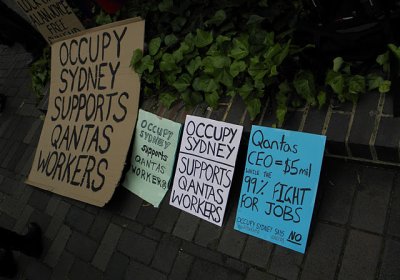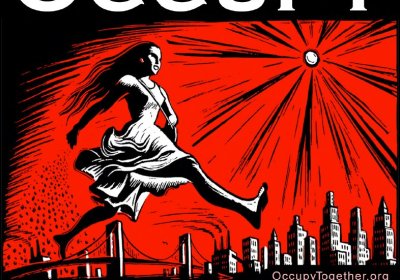On October 18, about 200 students held a “Save Political Economy” demonstration at the University of Sydney, organised by the Political Economy Students Society (EcopSoc).
The university administration is considering abolishing political economy as a separate department.
The department was established in the 1970s after a big campaign of protests and occupations by students and staff who wanted economics courses that taught a wide range of theories — not just the right-wing orthodoxy.
901
The article below is an abridged US Socialist Worker editorial in response to United States President Barack Obama's October 21 announcement that all US soldiers would be withdrawn from Iraq by the end of the year.
* * *
More than a million Iraqis dead. Nearly 5000 US military personnel killed, and about 32,000 more maimed, physically and psychologically.
About US$4 trillion spent on war ― money that could have paid for schools, health care and programs to create jobs.
Inside Pine Gap: The Spy Who Came in from the Desert
By David Rosenberg
Hardie Grant Books, 2011
216 pages, $35 (pb)
David Rosenberg found 1960s television show Mission Impossible “irresistible” with its patriotic tales of high-tech US government spies thwarting the “bad guys”.
After an 18-year career as a US National Security Agency (NSA) electronic signals analyst at the CIA’s Pine Gap spy base in Australia’s remote interior, Rosenberg’s book, Inside Pine Gap, makes it clear that he has yet to grow up.
The Philippines, one of the poorest Asian nations with a huge foreign debt ― caused by successive corrupt governments ― remains a place of simmering class tension.
In the past six weeks, there have been mobilisations around a range of issues.
On October 11, there was a national day of action against rising energy costs. There were protests right across the archiapelago.
Residents turned off their power for half-an-hour and created a “noise barrage” with whistles and horns.
In September, Green Left Weekly spoke to Mamdouh Habashi and Dr Muhammad Hesham, members of the Egyptian Socialist Party (ESP), about developments in Egypt since the popular uprising overthrew dictator Hosni Mubarak on February 11.
The ESP is one of several new parties formed since Mubarak's ouster. A longer version of this interview can be found at ThawraEyewitness.blogspot.com.
* * *
What is the role of the Supreme Council of the Armed Forces (SCAF, who has been in power since Mubarak's ousting)?
Despite the police brutality faced by Occupy Melbourne protesters just over a week before during their eviction from City Square, Occupy Melbourne returned to the streets on October 29.
About 500 occupiers assembled at the State Library with the same anti-corporate message and a louder voice.
After the meeting at the State Library, there was a march to Treasury Gardens where the general assembly (GA) was held. During the march, the numbers swelled to 1000 or more.
The decision by Qantas management to ground the airline's fleet and look out its workforce has caused uproar around the country. However, the mainstream media have overwhelmingly focused on the position and arguments publicly put by Qantas CEO Alan Joyce.
“I don't understand what the Occupy protests are all about,” is one common complaint in response to the global movement against corporate power.
About 1000 people took part in a march on the Commonwealth Heads of Government Meeting (CHOGM) in Perth on October 28. The peaceful march and rally involved people from many different movements and causes who united under the banner: “Justice and climate action, not racism and war.
Prime Minister Julia Gillard met Sri Lankan President Mahinda Rajapaksa on October 26 to discuss allegations of human rights abuses. The meeting took place just hours after a young Tamil refugee killed himself inside Sydney’s Villawood Immigration Detention Centre.
The Party of Wall Street has ruled unchallenged in the United States for far too long.
It has totally dominated the policies of presidents over at least four decades (if not longer). It has legally corrupted Congress via the craven dependency of politicians in both parties upon its money and upon access to the mainstream media it controls.
Justice for West Papua
I write to express my deep distress at the recent brutal attacks and killings by the Indonesian military in West Papua. While the Australian government and people should strive for good relations with Indonesia, this should not at the expense of Australia covering up, excusing, condoning or abetting human rights violations and repression in West Papua.
The Indonesian army has a long, sordid history of abuses and other appalling actions in East Timor and elsewhere and is still pursuing these same brutal, oppressive policies in West Papua.
- Previous page
- Page 2
- Next page








